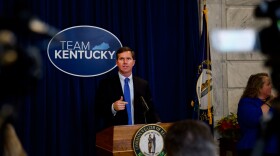In a surprising move, Mayor Greg Fischer's next fiscal year budget does not include significant proposed allocations due to economic and public health uncertainty caused by the coronavirus pandemic. The mayor is making his budget address Thursday afternoon.
Fischer forecasts a budget shortfall of $46 million for the current fiscal year, and another $69 million for the fiscal year starting July 1. Anticipated drops and delays in Louisville's major revenue sources of occupational, net profits and property taxes are driving those shortages.
The city may use a combination of rainy day funds, one-time funding sources and a line of credit to make up for those losses, officials said.
There is too much unknown about the future for the city to embark on the massive cuts Fischer has been warning about, he said.
Last week, he announced about 380 Metro employees would be indefinitely furloughed starting in May.
The choice to continue this year's budget -- which was itself cut by more than $25 million last summer due to employee pension and healthcare costs -- is not typical. But without knowing how much federal support the city may get for its regular operations, if any, Fischer said future cuts could be almost triple the level of last year's.
He said that if federal assistance isn't received or known to be on its way by Oct. 1, the city could need to start implementing cuts totaling up to $69 million. That could impact more than 1,000 of Metro's 5,200 employees, which is 400 fewer than 2017 staffing levels, he said.
Fischer said he hoped such cuts would not be needed.
Budget Fills Gap With Rainy Day Funds
The administration is proposing using about two-thirds of its $71 million rainy day fund to offset the shortages, the city's chief financial officer Daniel Frockt said. About $27 million could be used for the end of the current fiscal year, as well as about $19 million for the new year starting in July.
The Metro Council is likely to pass an ordinance Thursday night authorizing the administration to issue short-term debt for operating costs, an approach the city typically doesn't use. Frockt said he did not anticipate needing to access a line of credit for this fiscal year, but wanted to be prepared in case it's needed later.
A major question looming over the proposal and future budget discussions is when Louisville will be able to reopen its economy. That's a decision local and state leaders have said needs to be approached cautiously.
But as long as businesses remain closed, unemployment will remain high. That will continue to affect city revenues in the form of occupational and net profits taxes.
A budget document released Thursday contrasts the current situation to the Great Recession. In that period, it took 27 months for the Louisville metro area to lose 59,000 jobs, or 9.5%, and a further 45 months to regain them.
"It is early yet in this recession, but it appears that at least that number and percentage of jobs in the (Metropolitan Statistical Area) have been lost in four weeks," the Mayor's Recommended Executive Budget reads.
The document goes on to say future revenue estimates will be based on how far those numbers fall and for how long, as well as how long recovery takes. Plus, pension expenses will likely increase again after the next fiscal year. The rate for the fiscal year starting in July has been frozen to current rates due to the pandemic.
Frockt said some global forecasts suggest jobs may not return to pre-pandemic levels until 2023.
Fischer said he hopes the economy Louisville rebuilds will be more equitable. He shared a draft recovery plan online, which includes opportunities for Louisville residents to participate.
Metro Council Responds With Concern
Council president David James (D-6) said lawmakers have worked closely with the administration throughout the pandemic. And while the council will pass a budget before July 1, as in normal years, there's a likelihood there will be many changes to it after that date, he said.
Some council members are concerned about aspects of the mayor's proposal, including borrowing heavily from the rainy day fund and delaying potential cuts. Markus Winkler (D-17) said on a call with media Thursday afternoon that the council pays about $1 million to $3 million a year into the rainy day fund.
"So, borrowing that amount of money would take decades to pay back," he said. "And so I think we do need to have consideration for how we would pay that back."
Winkler also said he would support cuts sooner, rather than a continuation budget that would potentially put council in the position of having to react this fall if the city does not receive federal stimulus funds for operations.
Budget chair Bill Hollander (D-9) said it was inevitable that the city would use some of its rainy day fund, but he could not say what he thought was an appropriate amount to use.
"We have to be very prudent about how we tap the rainy day fund, and how quickly we move to cut other expenditures if federal relief does not (come)," he said.
Minority caucus chair Kevin Kramer (R-11) said it would be reasonable for the mayor to return to council in October to discuss cuts. But he said the mayor does not have to spend at the approved level in the meantime.
"I don't think the mayor intends to wait that long before he makes decisions about spending and in every conversation I've had with him, he's made it clear that he recognizes how fluid the situation is and that honestly, he'll be making decisions as information comes in," Kramer said.
Another minority caucus member, Scott Reed (R-16) reiterated a message shared often recently by council and the mayor: the city needs federal help to balance its budget.
The Metro Council will consider and refine the budget over the next two months, before passing a final version in late June.






